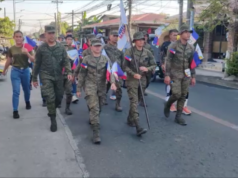The Foundation for Economic Freedom (FEF) said such a move “will only drive investments and jobs away from the countryside.”
In a statement, FEF cited the World Bank as saying that the Philippines “already has one of the highest minimum wages in the world relative to average wages.”
“Seeking to impose high minimum wages in the entire country irrespective of local conditions of unemployment and cost of living will only drive investments and jobs away from the countryside,” the group said.
This, after the Anakpawis party list and the Kilusang Mayo Uno (KMU) pressed for their demand for a nationwide P750 daily minimum wage, on top of their call for an immediate stop to the socalled “endo” or contractualization of workers.
FEF said, however, that “a national minimum wage policy will further deepen poverty and unemployment in the countryside, contrary to the administration’s policy to rebalance growth away from the National Capital Region. “
“In order to encourage investments in labor-intensive industries which will reduce the country’s high unemployment problem, we urge the modernization of the labor code to relax the code’s short and strict labor security provisions and to allow for workers and companies to freely negotiate wages,” the FEF statement said.
The group also urged the Duterte administration “to consider the creation of special economic zones where labor-intensive industries can be set up, exempted from the mandatory implementation of legal minimum wages.”
It noted that “ labor-intensive industries like garments and light manufacturing are avoiding the Philippines because of its high minimum wages and they now prefer Vietnam and Indonesia.”




